Evaluating the Role of Systems Thinking in Environmental Solutions
VerifiedAdded on 2023/06/07
|10
|2953
|209
Essay
AI Summary
This essay evaluates the application of systems thinking in addressing social and environmental sustainability challenges, particularly focusing on the Australian manufacturing industry's energy security. It highlights the limitations of traditional problem-solving approaches when dealing with complex issues like climate change and resource depletion. The essay discusses how Australia's abundant resources have been exploited without considering long-term sustainability, leading to potential energy crises. It emphasizes the importance of considering various dimensions of energy security, including environmental, economic, and social stability. Furthermore, it explores the concept of 'wicked problems' in the context of sustainability and suggests recommendations for promoting mass awareness and integrating energy security into business policies. The essay concludes that systems thinking offers a valuable framework for developing sustainable solutions by considering the interconnectedness of various factors and promoting a holistic approach to problem-solving, which is essential for achieving long-term environmental and social sustainability.
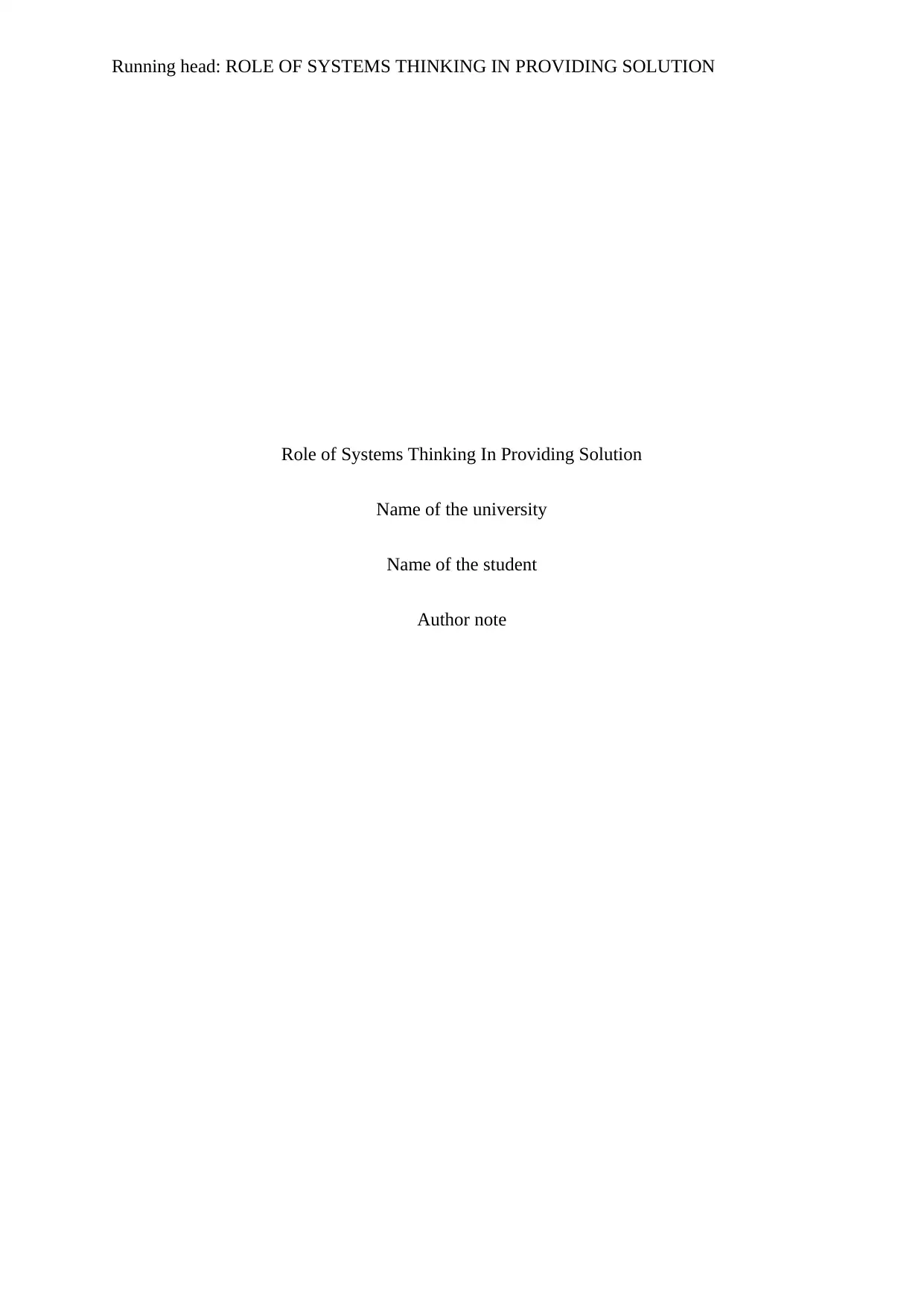
Running head: ROLE OF SYSTEMS THINKING IN PROVIDING SOLUTION
Role of Systems Thinking In Providing Solution
Name of the university
Name of the student
Author note
Role of Systems Thinking In Providing Solution
Name of the university
Name of the student
Author note
Paraphrase This Document
Need a fresh take? Get an instant paraphrase of this document with our AI Paraphraser
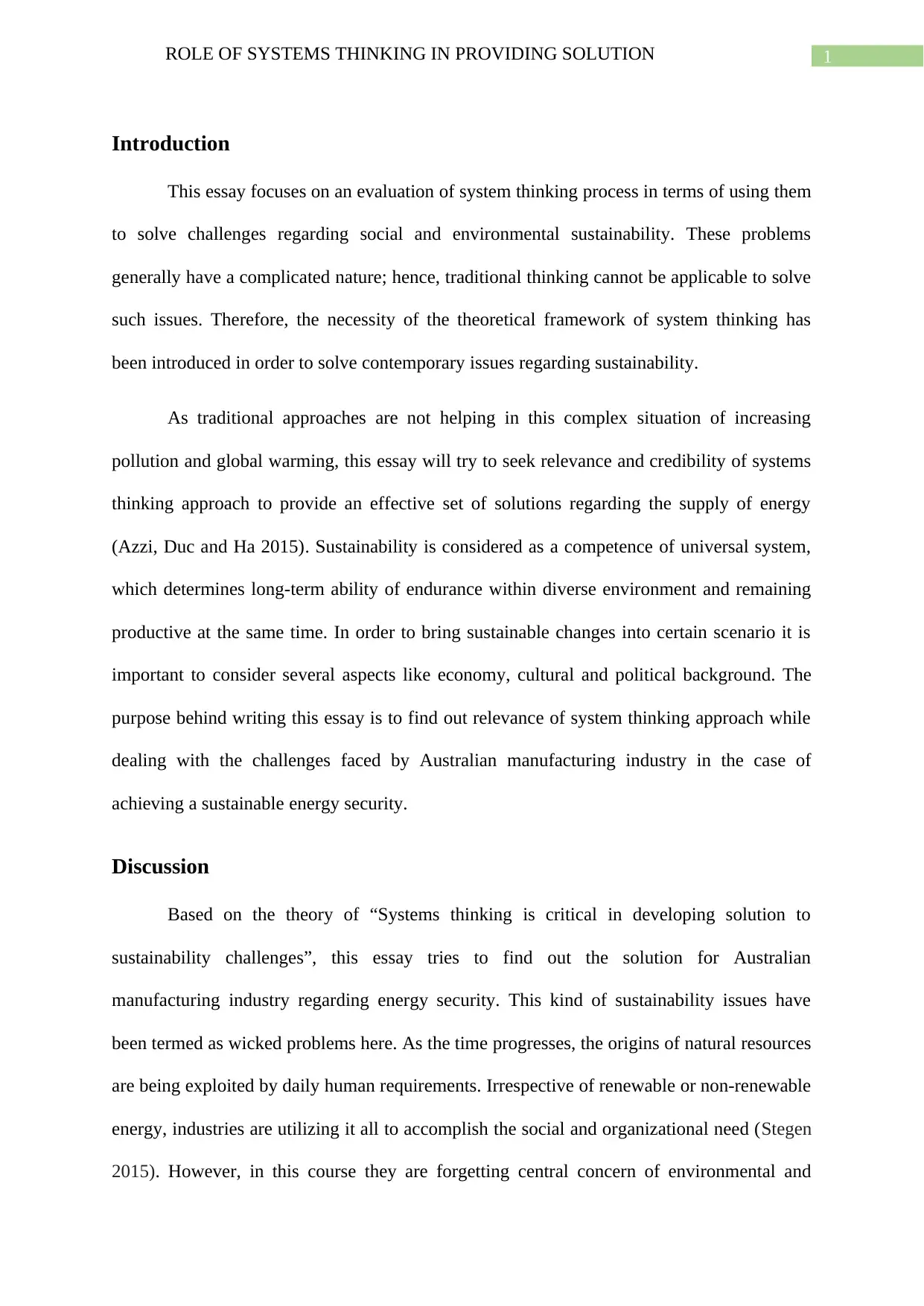
1ROLE OF SYSTEMS THINKING IN PROVIDING SOLUTION
Introduction
This essay focuses on an evaluation of system thinking process in terms of using them
to solve challenges regarding social and environmental sustainability. These problems
generally have a complicated nature; hence, traditional thinking cannot be applicable to solve
such issues. Therefore, the necessity of the theoretical framework of system thinking has
been introduced in order to solve contemporary issues regarding sustainability.
As traditional approaches are not helping in this complex situation of increasing
pollution and global warming, this essay will try to seek relevance and credibility of systems
thinking approach to provide an effective set of solutions regarding the supply of energy
(Azzi, Duc and Ha 2015). Sustainability is considered as a competence of universal system,
which determines long-term ability of endurance within diverse environment and remaining
productive at the same time. In order to bring sustainable changes into certain scenario it is
important to consider several aspects like economy, cultural and political background. The
purpose behind writing this essay is to find out relevance of system thinking approach while
dealing with the challenges faced by Australian manufacturing industry in the case of
achieving a sustainable energy security.
Discussion
Based on the theory of “Systems thinking is critical in developing solution to
sustainability challenges”, this essay tries to find out the solution for Australian
manufacturing industry regarding energy security. This kind of sustainability issues have
been termed as wicked problems here. As the time progresses, the origins of natural resources
are being exploited by daily human requirements. Irrespective of renewable or non-renewable
energy, industries are utilizing it all to accomplish the social and organizational need (Stegen
2015). However, in this course they are forgetting central concern of environmental and
Introduction
This essay focuses on an evaluation of system thinking process in terms of using them
to solve challenges regarding social and environmental sustainability. These problems
generally have a complicated nature; hence, traditional thinking cannot be applicable to solve
such issues. Therefore, the necessity of the theoretical framework of system thinking has
been introduced in order to solve contemporary issues regarding sustainability.
As traditional approaches are not helping in this complex situation of increasing
pollution and global warming, this essay will try to seek relevance and credibility of systems
thinking approach to provide an effective set of solutions regarding the supply of energy
(Azzi, Duc and Ha 2015). Sustainability is considered as a competence of universal system,
which determines long-term ability of endurance within diverse environment and remaining
productive at the same time. In order to bring sustainable changes into certain scenario it is
important to consider several aspects like economy, cultural and political background. The
purpose behind writing this essay is to find out relevance of system thinking approach while
dealing with the challenges faced by Australian manufacturing industry in the case of
achieving a sustainable energy security.
Discussion
Based on the theory of “Systems thinking is critical in developing solution to
sustainability challenges”, this essay tries to find out the solution for Australian
manufacturing industry regarding energy security. This kind of sustainability issues have
been termed as wicked problems here. As the time progresses, the origins of natural resources
are being exploited by daily human requirements. Irrespective of renewable or non-renewable
energy, industries are utilizing it all to accomplish the social and organizational need (Stegen
2015). However, in this course they are forgetting central concern of environmental and

2ROLE OF SYSTEMS THINKING IN PROVIDING SOLUTION
social sustainability. The relevance of traditional solutions cannot be found as contemporary
climate condition is way too complicated than it used to be in the past.
According to the perspectives shared by Cleanenergycouncil.org.au (2018), Australia
is immensely enriched with the resources; possessing approximately 40% of the world’s
uranium quantity and home for almost 10% of the coal resources and 2% of the world’s
natural gas. The country contributes 3% of the world’s energy and holds the position of
world’s ninth largest energy production unit. In terms of exporting the uranium and coal, it is
largest as well. It has been observed that it exports more than 60% of the production,
excluding the remaining part for their own necessities. However, Australia has failed to
understand the value of energy and has been exploiting the potential resources for a
prolonged period. As they are geographically blessed if not in near future, in the long run
they have to face the energy crisis undoubtedly.
Therefore, according to the studies of Biggs et al. (2015), in order to restrict such
extravagant practices several researchers have identified various dimensions of energy
security which are national economic security, sustainability and environmental security,
security of food and drinking water as well as social stability is important to establish a
practice of secured consumption of energy in Australian countries. These are the majorly
discussed areas where the crisis occurs frequently. Energy security can be viewed from four
different perspectives as far as these dimensions are concerned.
For instance, if the case of energy security is reflected through environmental
dimension, several environment related concerns would be highlighted in that course. As per
the studies of Nair et al. (2014), the ongoing issue of increasing greenhouse gases and
pollutants generated from manufacturing industries by utilizing fossil fuel to the extreme
level is the matter of concern. Therefore, as described in Davis et al. (2014), energy security
social sustainability. The relevance of traditional solutions cannot be found as contemporary
climate condition is way too complicated than it used to be in the past.
According to the perspectives shared by Cleanenergycouncil.org.au (2018), Australia
is immensely enriched with the resources; possessing approximately 40% of the world’s
uranium quantity and home for almost 10% of the coal resources and 2% of the world’s
natural gas. The country contributes 3% of the world’s energy and holds the position of
world’s ninth largest energy production unit. In terms of exporting the uranium and coal, it is
largest as well. It has been observed that it exports more than 60% of the production,
excluding the remaining part for their own necessities. However, Australia has failed to
understand the value of energy and has been exploiting the potential resources for a
prolonged period. As they are geographically blessed if not in near future, in the long run
they have to face the energy crisis undoubtedly.
Therefore, according to the studies of Biggs et al. (2015), in order to restrict such
extravagant practices several researchers have identified various dimensions of energy
security which are national economic security, sustainability and environmental security,
security of food and drinking water as well as social stability is important to establish a
practice of secured consumption of energy in Australian countries. These are the majorly
discussed areas where the crisis occurs frequently. Energy security can be viewed from four
different perspectives as far as these dimensions are concerned.
For instance, if the case of energy security is reflected through environmental
dimension, several environment related concerns would be highlighted in that course. As per
the studies of Nair et al. (2014), the ongoing issue of increasing greenhouse gases and
pollutants generated from manufacturing industries by utilizing fossil fuel to the extreme
level is the matter of concern. Therefore, as described in Davis et al. (2014), energy security
⊘ This is a preview!⊘
Do you want full access?
Subscribe today to unlock all pages.

Trusted by 1+ million students worldwide
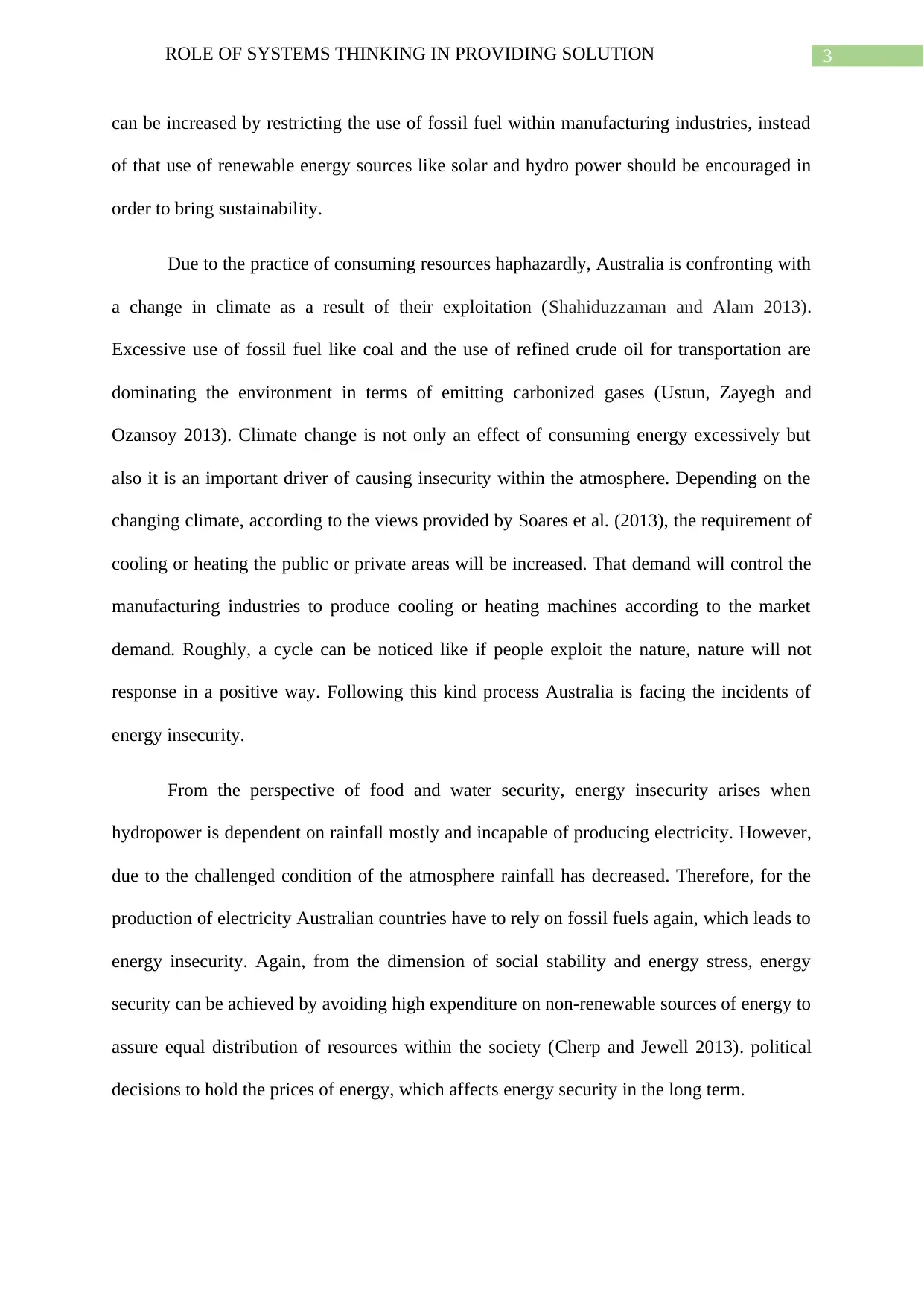
3ROLE OF SYSTEMS THINKING IN PROVIDING SOLUTION
can be increased by restricting the use of fossil fuel within manufacturing industries, instead
of that use of renewable energy sources like solar and hydro power should be encouraged in
order to bring sustainability.
Due to the practice of consuming resources haphazardly, Australia is confronting with
a change in climate as a result of their exploitation (Shahiduzzaman and Alam 2013).
Excessive use of fossil fuel like coal and the use of refined crude oil for transportation are
dominating the environment in terms of emitting carbonized gases (Ustun, Zayegh and
Ozansoy 2013). Climate change is not only an effect of consuming energy excessively but
also it is an important driver of causing insecurity within the atmosphere. Depending on the
changing climate, according to the views provided by Soares et al. (2013), the requirement of
cooling or heating the public or private areas will be increased. That demand will control the
manufacturing industries to produce cooling or heating machines according to the market
demand. Roughly, a cycle can be noticed like if people exploit the nature, nature will not
response in a positive way. Following this kind process Australia is facing the incidents of
energy insecurity.
From the perspective of food and water security, energy insecurity arises when
hydropower is dependent on rainfall mostly and incapable of producing electricity. However,
due to the challenged condition of the atmosphere rainfall has decreased. Therefore, for the
production of electricity Australian countries have to rely on fossil fuels again, which leads to
energy insecurity. Again, from the dimension of social stability and energy stress, energy
security can be achieved by avoiding high expenditure on non-renewable sources of energy to
assure equal distribution of resources within the society (Cherp and Jewell 2013). political
decisions to hold the prices of energy, which affects energy security in the long term.
can be increased by restricting the use of fossil fuel within manufacturing industries, instead
of that use of renewable energy sources like solar and hydro power should be encouraged in
order to bring sustainability.
Due to the practice of consuming resources haphazardly, Australia is confronting with
a change in climate as a result of their exploitation (Shahiduzzaman and Alam 2013).
Excessive use of fossil fuel like coal and the use of refined crude oil for transportation are
dominating the environment in terms of emitting carbonized gases (Ustun, Zayegh and
Ozansoy 2013). Climate change is not only an effect of consuming energy excessively but
also it is an important driver of causing insecurity within the atmosphere. Depending on the
changing climate, according to the views provided by Soares et al. (2013), the requirement of
cooling or heating the public or private areas will be increased. That demand will control the
manufacturing industries to produce cooling or heating machines according to the market
demand. Roughly, a cycle can be noticed like if people exploit the nature, nature will not
response in a positive way. Following this kind process Australia is facing the incidents of
energy insecurity.
From the perspective of food and water security, energy insecurity arises when
hydropower is dependent on rainfall mostly and incapable of producing electricity. However,
due to the challenged condition of the atmosphere rainfall has decreased. Therefore, for the
production of electricity Australian countries have to rely on fossil fuels again, which leads to
energy insecurity. Again, from the dimension of social stability and energy stress, energy
security can be achieved by avoiding high expenditure on non-renewable sources of energy to
assure equal distribution of resources within the society (Cherp and Jewell 2013). political
decisions to hold the prices of energy, which affects energy security in the long term.
Paraphrase This Document
Need a fresh take? Get an instant paraphrase of this document with our AI Paraphraser
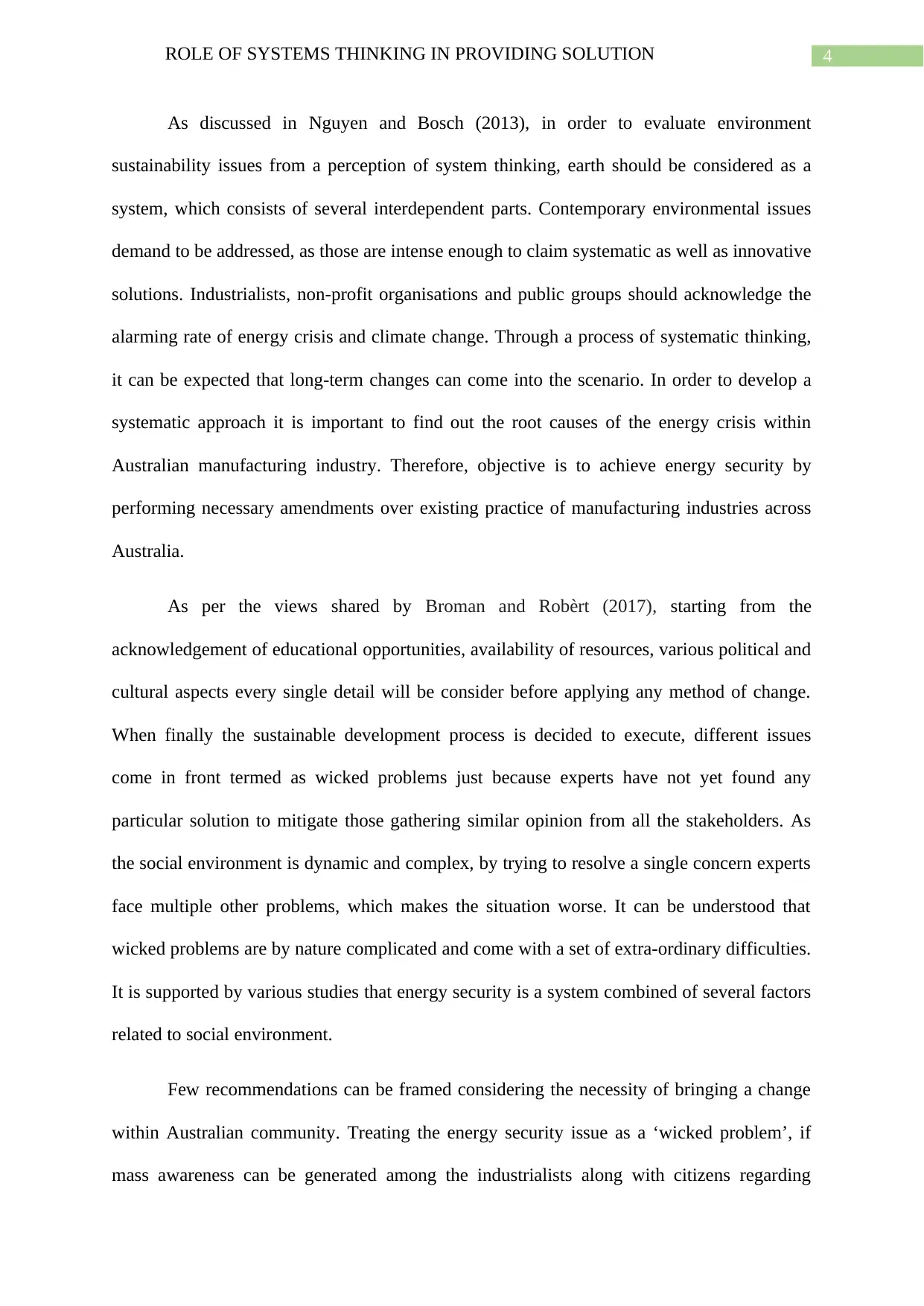
4ROLE OF SYSTEMS THINKING IN PROVIDING SOLUTION
As discussed in Nguyen and Bosch (2013), in order to evaluate environment
sustainability issues from a perception of system thinking, earth should be considered as a
system, which consists of several interdependent parts. Contemporary environmental issues
demand to be addressed, as those are intense enough to claim systematic as well as innovative
solutions. Industrialists, non-profit organisations and public groups should acknowledge the
alarming rate of energy crisis and climate change. Through a process of systematic thinking,
it can be expected that long-term changes can come into the scenario. In order to develop a
systematic approach it is important to find out the root causes of the energy crisis within
Australian manufacturing industry. Therefore, objective is to achieve energy security by
performing necessary amendments over existing practice of manufacturing industries across
Australia.
As per the views shared by Broman and Robèrt (2017), starting from the
acknowledgement of educational opportunities, availability of resources, various political and
cultural aspects every single detail will be consider before applying any method of change.
When finally the sustainable development process is decided to execute, different issues
come in front termed as wicked problems just because experts have not yet found any
particular solution to mitigate those gathering similar opinion from all the stakeholders. As
the social environment is dynamic and complex, by trying to resolve a single concern experts
face multiple other problems, which makes the situation worse. It can be understood that
wicked problems are by nature complicated and come with a set of extra-ordinary difficulties.
It is supported by various studies that energy security is a system combined of several factors
related to social environment.
Few recommendations can be framed considering the necessity of bringing a change
within Australian community. Treating the energy security issue as a ‘wicked problem’, if
mass awareness can be generated among the industrialists along with citizens regarding
As discussed in Nguyen and Bosch (2013), in order to evaluate environment
sustainability issues from a perception of system thinking, earth should be considered as a
system, which consists of several interdependent parts. Contemporary environmental issues
demand to be addressed, as those are intense enough to claim systematic as well as innovative
solutions. Industrialists, non-profit organisations and public groups should acknowledge the
alarming rate of energy crisis and climate change. Through a process of systematic thinking,
it can be expected that long-term changes can come into the scenario. In order to develop a
systematic approach it is important to find out the root causes of the energy crisis within
Australian manufacturing industry. Therefore, objective is to achieve energy security by
performing necessary amendments over existing practice of manufacturing industries across
Australia.
As per the views shared by Broman and Robèrt (2017), starting from the
acknowledgement of educational opportunities, availability of resources, various political and
cultural aspects every single detail will be consider before applying any method of change.
When finally the sustainable development process is decided to execute, different issues
come in front termed as wicked problems just because experts have not yet found any
particular solution to mitigate those gathering similar opinion from all the stakeholders. As
the social environment is dynamic and complex, by trying to resolve a single concern experts
face multiple other problems, which makes the situation worse. It can be understood that
wicked problems are by nature complicated and come with a set of extra-ordinary difficulties.
It is supported by various studies that energy security is a system combined of several factors
related to social environment.
Few recommendations can be framed considering the necessity of bringing a change
within Australian community. Treating the energy security issue as a ‘wicked problem’, if
mass awareness can be generated among the industrialists along with citizens regarding
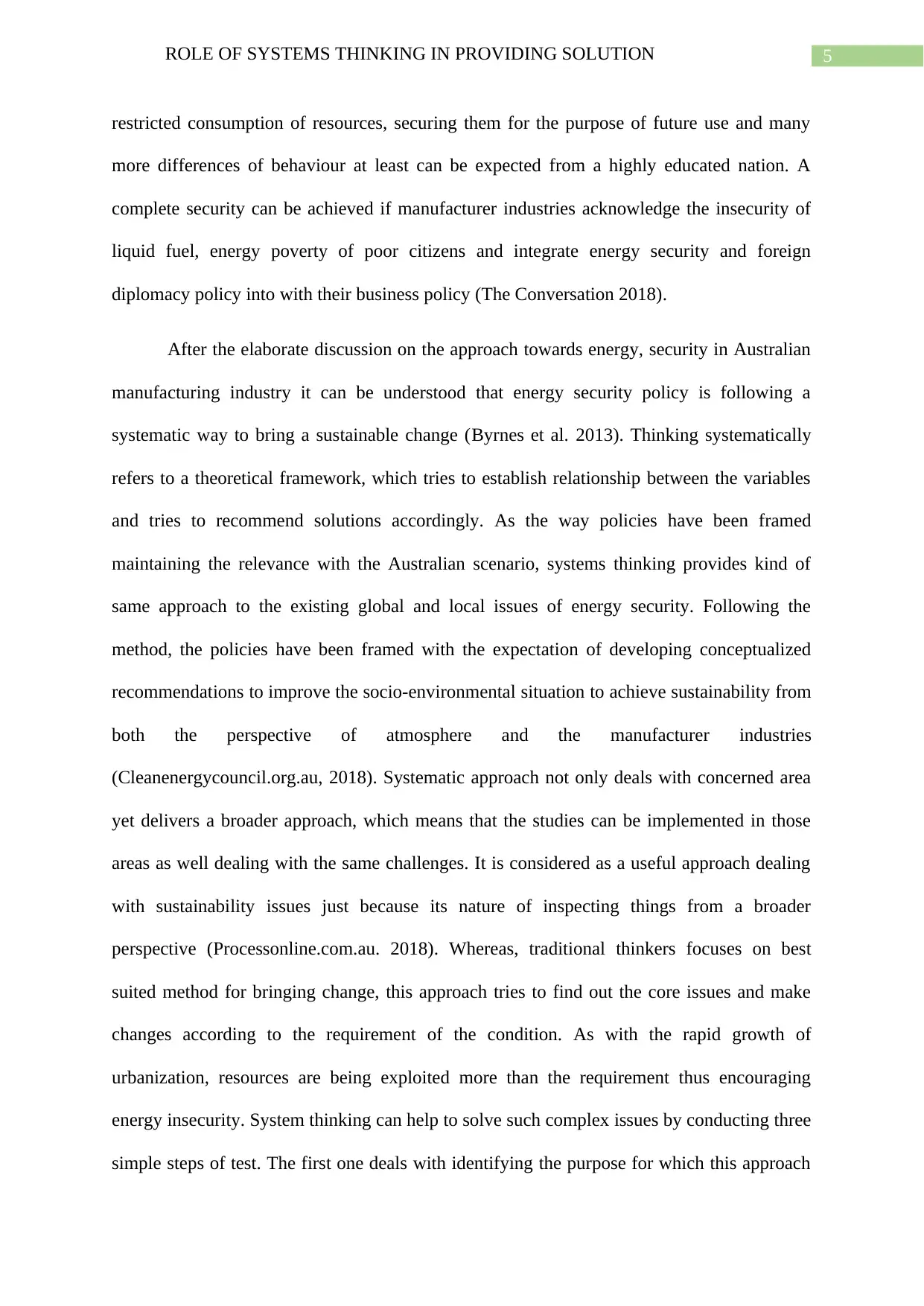
5ROLE OF SYSTEMS THINKING IN PROVIDING SOLUTION
restricted consumption of resources, securing them for the purpose of future use and many
more differences of behaviour at least can be expected from a highly educated nation. A
complete security can be achieved if manufacturer industries acknowledge the insecurity of
liquid fuel, energy poverty of poor citizens and integrate energy security and foreign
diplomacy policy into with their business policy (The Conversation 2018).
After the elaborate discussion on the approach towards energy, security in Australian
manufacturing industry it can be understood that energy security policy is following a
systematic way to bring a sustainable change (Byrnes et al. 2013). Thinking systematically
refers to a theoretical framework, which tries to establish relationship between the variables
and tries to recommend solutions accordingly. As the way policies have been framed
maintaining the relevance with the Australian scenario, systems thinking provides kind of
same approach to the existing global and local issues of energy security. Following the
method, the policies have been framed with the expectation of developing conceptualized
recommendations to improve the socio-environmental situation to achieve sustainability from
both the perspective of atmosphere and the manufacturer industries
(Cleanenergycouncil.org.au, 2018). Systematic approach not only deals with concerned area
yet delivers a broader approach, which means that the studies can be implemented in those
areas as well dealing with the same challenges. It is considered as a useful approach dealing
with sustainability issues just because its nature of inspecting things from a broader
perspective (Processonline.com.au. 2018). Whereas, traditional thinkers focuses on best
suited method for bringing change, this approach tries to find out the core issues and make
changes according to the requirement of the condition. As with the rapid growth of
urbanization, resources are being exploited more than the requirement thus encouraging
energy insecurity. System thinking can help to solve such complex issues by conducting three
simple steps of test. The first one deals with identifying the purpose for which this approach
restricted consumption of resources, securing them for the purpose of future use and many
more differences of behaviour at least can be expected from a highly educated nation. A
complete security can be achieved if manufacturer industries acknowledge the insecurity of
liquid fuel, energy poverty of poor citizens and integrate energy security and foreign
diplomacy policy into with their business policy (The Conversation 2018).
After the elaborate discussion on the approach towards energy, security in Australian
manufacturing industry it can be understood that energy security policy is following a
systematic way to bring a sustainable change (Byrnes et al. 2013). Thinking systematically
refers to a theoretical framework, which tries to establish relationship between the variables
and tries to recommend solutions accordingly. As the way policies have been framed
maintaining the relevance with the Australian scenario, systems thinking provides kind of
same approach to the existing global and local issues of energy security. Following the
method, the policies have been framed with the expectation of developing conceptualized
recommendations to improve the socio-environmental situation to achieve sustainability from
both the perspective of atmosphere and the manufacturer industries
(Cleanenergycouncil.org.au, 2018). Systematic approach not only deals with concerned area
yet delivers a broader approach, which means that the studies can be implemented in those
areas as well dealing with the same challenges. It is considered as a useful approach dealing
with sustainability issues just because its nature of inspecting things from a broader
perspective (Processonline.com.au. 2018). Whereas, traditional thinkers focuses on best
suited method for bringing change, this approach tries to find out the core issues and make
changes according to the requirement of the condition. As with the rapid growth of
urbanization, resources are being exploited more than the requirement thus encouraging
energy insecurity. System thinking can help to solve such complex issues by conducting three
simple steps of test. The first one deals with identifying the purpose for which this approach
⊘ This is a preview!⊘
Do you want full access?
Subscribe today to unlock all pages.

Trusted by 1+ million students worldwide
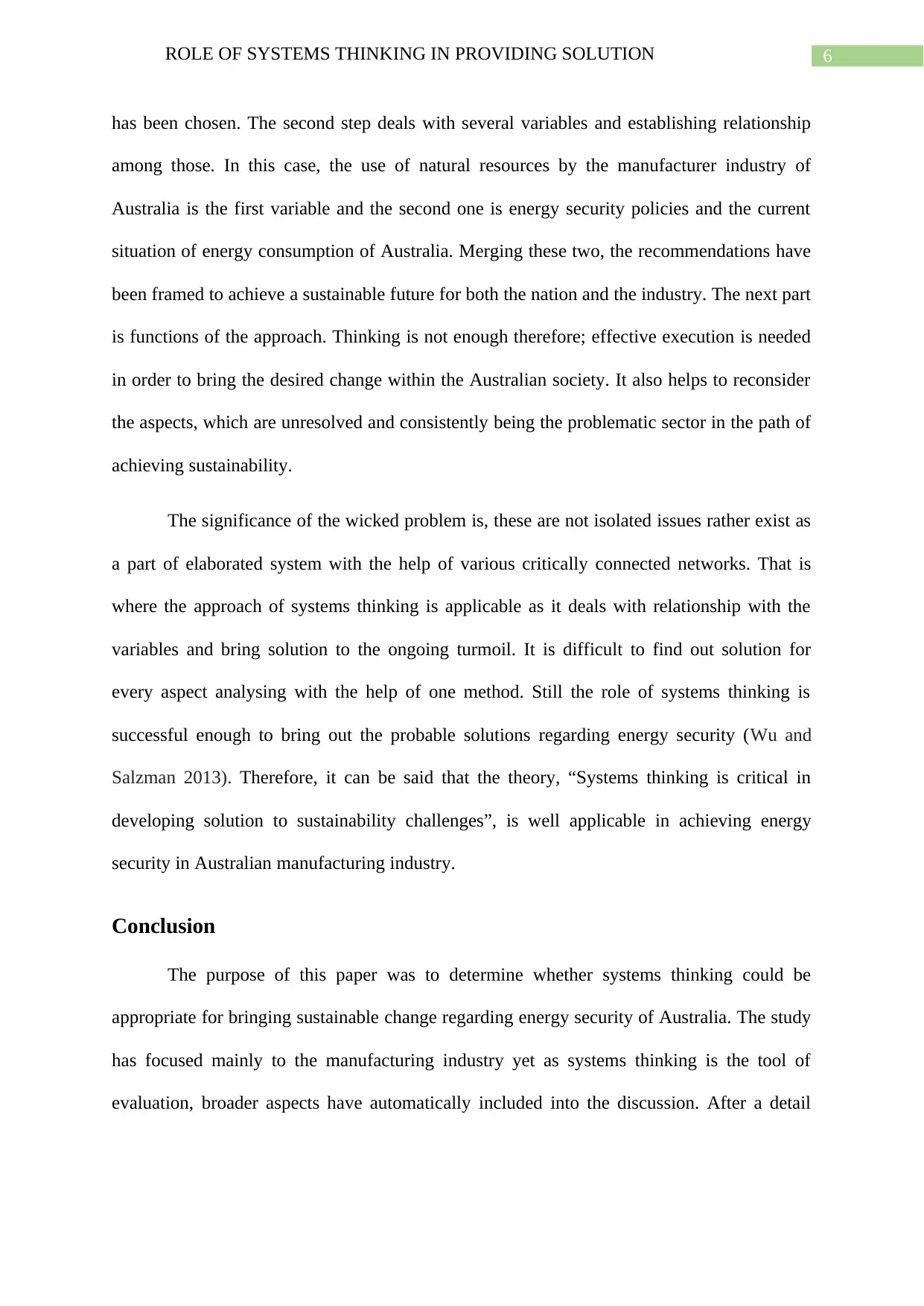
6ROLE OF SYSTEMS THINKING IN PROVIDING SOLUTION
has been chosen. The second step deals with several variables and establishing relationship
among those. In this case, the use of natural resources by the manufacturer industry of
Australia is the first variable and the second one is energy security policies and the current
situation of energy consumption of Australia. Merging these two, the recommendations have
been framed to achieve a sustainable future for both the nation and the industry. The next part
is functions of the approach. Thinking is not enough therefore; effective execution is needed
in order to bring the desired change within the Australian society. It also helps to reconsider
the aspects, which are unresolved and consistently being the problematic sector in the path of
achieving sustainability.
The significance of the wicked problem is, these are not isolated issues rather exist as
a part of elaborated system with the help of various critically connected networks. That is
where the approach of systems thinking is applicable as it deals with relationship with the
variables and bring solution to the ongoing turmoil. It is difficult to find out solution for
every aspect analysing with the help of one method. Still the role of systems thinking is
successful enough to bring out the probable solutions regarding energy security (Wu and
Salzman 2013). Therefore, it can be said that the theory, “Systems thinking is critical in
developing solution to sustainability challenges”, is well applicable in achieving energy
security in Australian manufacturing industry.
Conclusion
The purpose of this paper was to determine whether systems thinking could be
appropriate for bringing sustainable change regarding energy security of Australia. The study
has focused mainly to the manufacturing industry yet as systems thinking is the tool of
evaluation, broader aspects have automatically included into the discussion. After a detail
has been chosen. The second step deals with several variables and establishing relationship
among those. In this case, the use of natural resources by the manufacturer industry of
Australia is the first variable and the second one is energy security policies and the current
situation of energy consumption of Australia. Merging these two, the recommendations have
been framed to achieve a sustainable future for both the nation and the industry. The next part
is functions of the approach. Thinking is not enough therefore; effective execution is needed
in order to bring the desired change within the Australian society. It also helps to reconsider
the aspects, which are unresolved and consistently being the problematic sector in the path of
achieving sustainability.
The significance of the wicked problem is, these are not isolated issues rather exist as
a part of elaborated system with the help of various critically connected networks. That is
where the approach of systems thinking is applicable as it deals with relationship with the
variables and bring solution to the ongoing turmoil. It is difficult to find out solution for
every aspect analysing with the help of one method. Still the role of systems thinking is
successful enough to bring out the probable solutions regarding energy security (Wu and
Salzman 2013). Therefore, it can be said that the theory, “Systems thinking is critical in
developing solution to sustainability challenges”, is well applicable in achieving energy
security in Australian manufacturing industry.
Conclusion
The purpose of this paper was to determine whether systems thinking could be
appropriate for bringing sustainable change regarding energy security of Australia. The study
has focused mainly to the manufacturing industry yet as systems thinking is the tool of
evaluation, broader aspects have automatically included into the discussion. After a detail
Paraphrase This Document
Need a fresh take? Get an instant paraphrase of this document with our AI Paraphraser
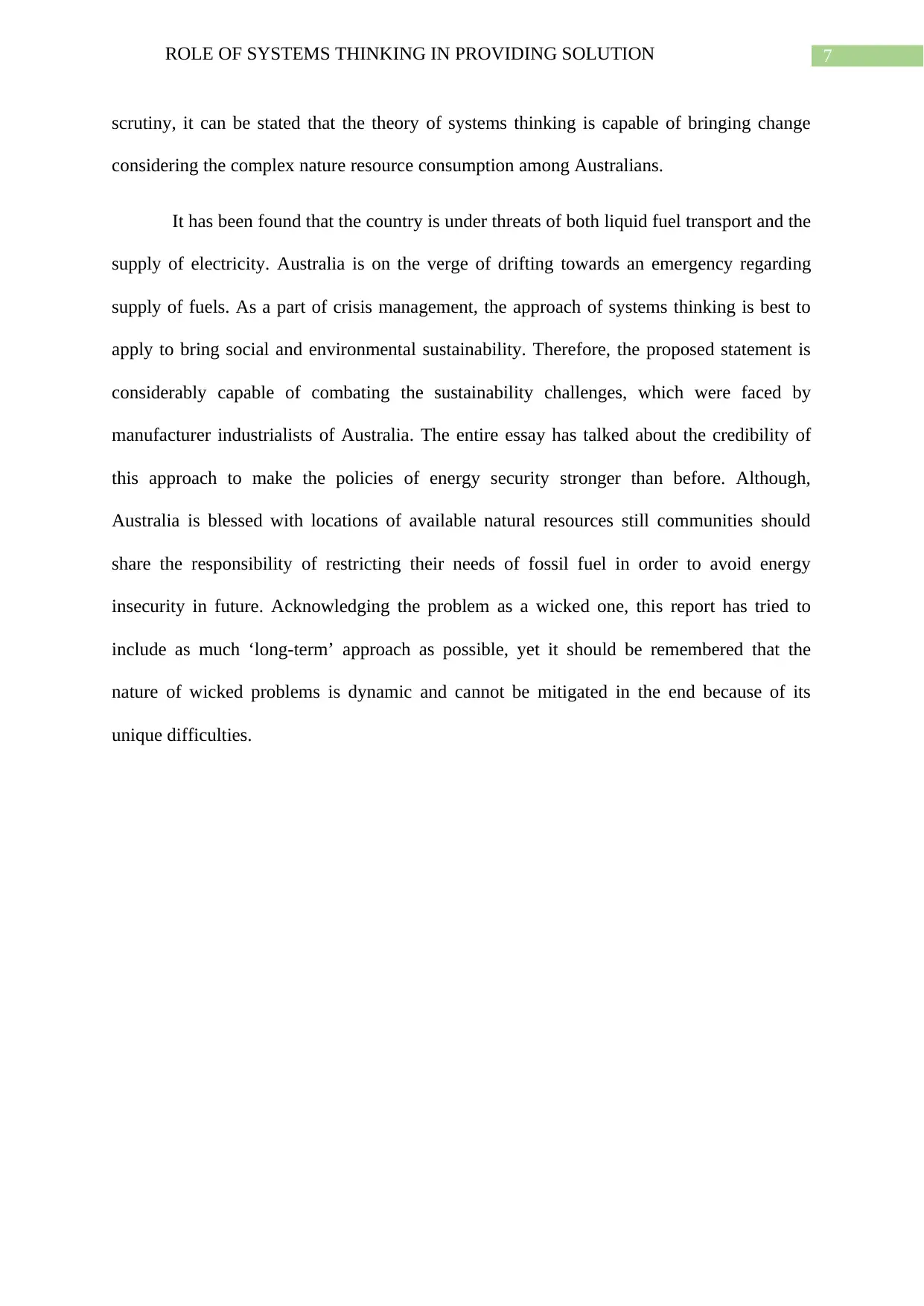
7ROLE OF SYSTEMS THINKING IN PROVIDING SOLUTION
scrutiny, it can be stated that the theory of systems thinking is capable of bringing change
considering the complex nature resource consumption among Australians.
It has been found that the country is under threats of both liquid fuel transport and the
supply of electricity. Australia is on the verge of drifting towards an emergency regarding
supply of fuels. As a part of crisis management, the approach of systems thinking is best to
apply to bring social and environmental sustainability. Therefore, the proposed statement is
considerably capable of combating the sustainability challenges, which were faced by
manufacturer industrialists of Australia. The entire essay has talked about the credibility of
this approach to make the policies of energy security stronger than before. Although,
Australia is blessed with locations of available natural resources still communities should
share the responsibility of restricting their needs of fossil fuel in order to avoid energy
insecurity in future. Acknowledging the problem as a wicked one, this report has tried to
include as much ‘long-term’ approach as possible, yet it should be remembered that the
nature of wicked problems is dynamic and cannot be mitigated in the end because of its
unique difficulties.
scrutiny, it can be stated that the theory of systems thinking is capable of bringing change
considering the complex nature resource consumption among Australians.
It has been found that the country is under threats of both liquid fuel transport and the
supply of electricity. Australia is on the verge of drifting towards an emergency regarding
supply of fuels. As a part of crisis management, the approach of systems thinking is best to
apply to bring social and environmental sustainability. Therefore, the proposed statement is
considerably capable of combating the sustainability challenges, which were faced by
manufacturer industrialists of Australia. The entire essay has talked about the credibility of
this approach to make the policies of energy security stronger than before. Although,
Australia is blessed with locations of available natural resources still communities should
share the responsibility of restricting their needs of fossil fuel in order to avoid energy
insecurity in future. Acknowledging the problem as a wicked one, this report has tried to
include as much ‘long-term’ approach as possible, yet it should be remembered that the
nature of wicked problems is dynamic and cannot be mitigated in the end because of its
unique difficulties.
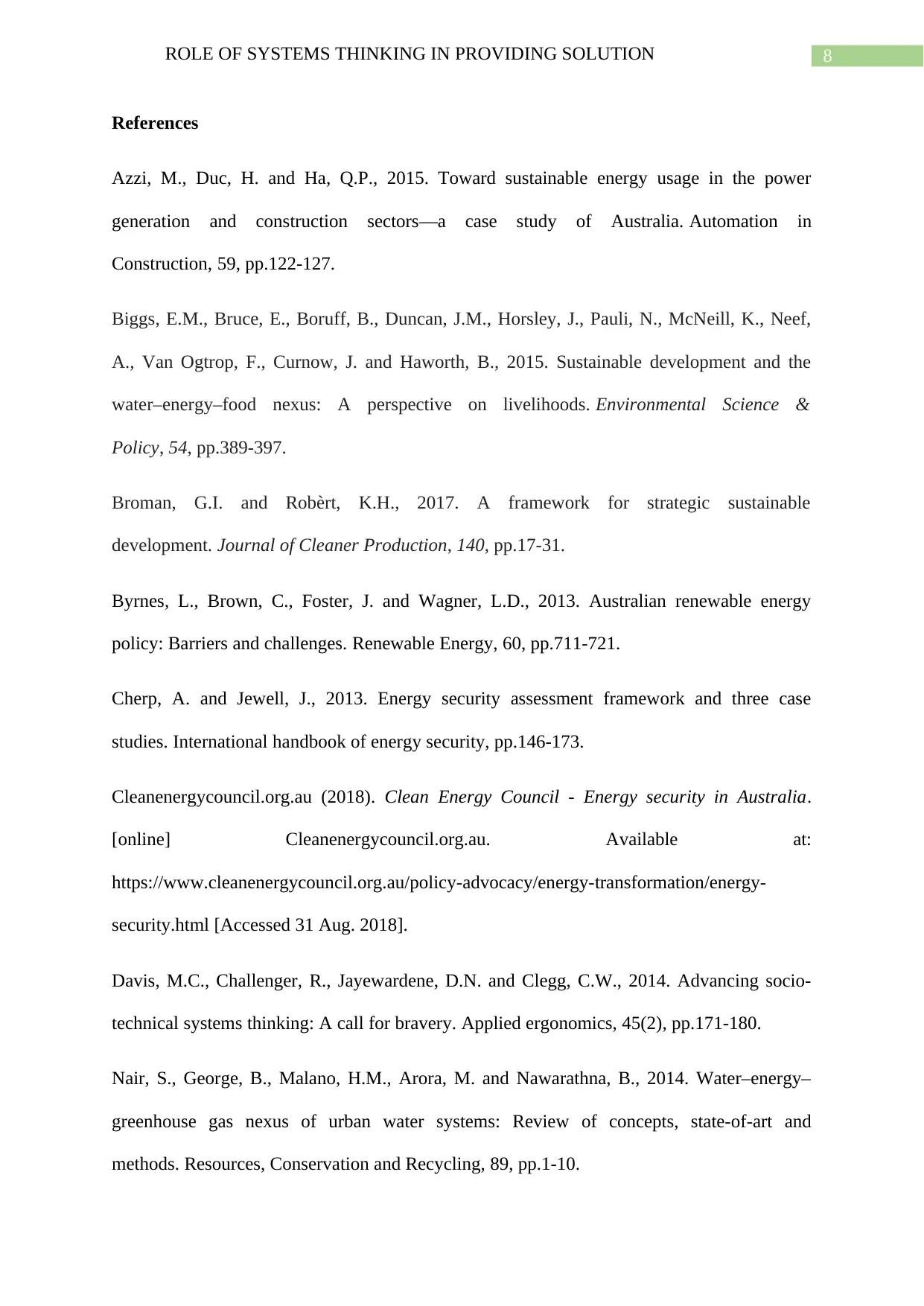
8ROLE OF SYSTEMS THINKING IN PROVIDING SOLUTION
References
Azzi, M., Duc, H. and Ha, Q.P., 2015. Toward sustainable energy usage in the power
generation and construction sectors—a case study of Australia. Automation in
Construction, 59, pp.122-127.
Biggs, E.M., Bruce, E., Boruff, B., Duncan, J.M., Horsley, J., Pauli, N., McNeill, K., Neef,
A., Van Ogtrop, F., Curnow, J. and Haworth, B., 2015. Sustainable development and the
water–energy–food nexus: A perspective on livelihoods. Environmental Science &
Policy, 54, pp.389-397.
Broman, G.I. and Robèrt, K.H., 2017. A framework for strategic sustainable
development. Journal of Cleaner Production, 140, pp.17-31.
Byrnes, L., Brown, C., Foster, J. and Wagner, L.D., 2013. Australian renewable energy
policy: Barriers and challenges. Renewable Energy, 60, pp.711-721.
Cherp, A. and Jewell, J., 2013. Energy security assessment framework and three case
studies. International handbook of energy security, pp.146-173.
Cleanenergycouncil.org.au (2018). Clean Energy Council - Energy security in Australia.
[online] Cleanenergycouncil.org.au. Available at:
https://www.cleanenergycouncil.org.au/policy-advocacy/energy-transformation/energy-
security.html [Accessed 31 Aug. 2018].
Davis, M.C., Challenger, R., Jayewardene, D.N. and Clegg, C.W., 2014. Advancing socio-
technical systems thinking: A call for bravery. Applied ergonomics, 45(2), pp.171-180.
Nair, S., George, B., Malano, H.M., Arora, M. and Nawarathna, B., 2014. Water–energy–
greenhouse gas nexus of urban water systems: Review of concepts, state-of-art and
methods. Resources, Conservation and Recycling, 89, pp.1-10.
References
Azzi, M., Duc, H. and Ha, Q.P., 2015. Toward sustainable energy usage in the power
generation and construction sectors—a case study of Australia. Automation in
Construction, 59, pp.122-127.
Biggs, E.M., Bruce, E., Boruff, B., Duncan, J.M., Horsley, J., Pauli, N., McNeill, K., Neef,
A., Van Ogtrop, F., Curnow, J. and Haworth, B., 2015. Sustainable development and the
water–energy–food nexus: A perspective on livelihoods. Environmental Science &
Policy, 54, pp.389-397.
Broman, G.I. and Robèrt, K.H., 2017. A framework for strategic sustainable
development. Journal of Cleaner Production, 140, pp.17-31.
Byrnes, L., Brown, C., Foster, J. and Wagner, L.D., 2013. Australian renewable energy
policy: Barriers and challenges. Renewable Energy, 60, pp.711-721.
Cherp, A. and Jewell, J., 2013. Energy security assessment framework and three case
studies. International handbook of energy security, pp.146-173.
Cleanenergycouncil.org.au (2018). Clean Energy Council - Energy security in Australia.
[online] Cleanenergycouncil.org.au. Available at:
https://www.cleanenergycouncil.org.au/policy-advocacy/energy-transformation/energy-
security.html [Accessed 31 Aug. 2018].
Davis, M.C., Challenger, R., Jayewardene, D.N. and Clegg, C.W., 2014. Advancing socio-
technical systems thinking: A call for bravery. Applied ergonomics, 45(2), pp.171-180.
Nair, S., George, B., Malano, H.M., Arora, M. and Nawarathna, B., 2014. Water–energy–
greenhouse gas nexus of urban water systems: Review of concepts, state-of-art and
methods. Resources, Conservation and Recycling, 89, pp.1-10.
⊘ This is a preview!⊘
Do you want full access?
Subscribe today to unlock all pages.

Trusted by 1+ million students worldwide
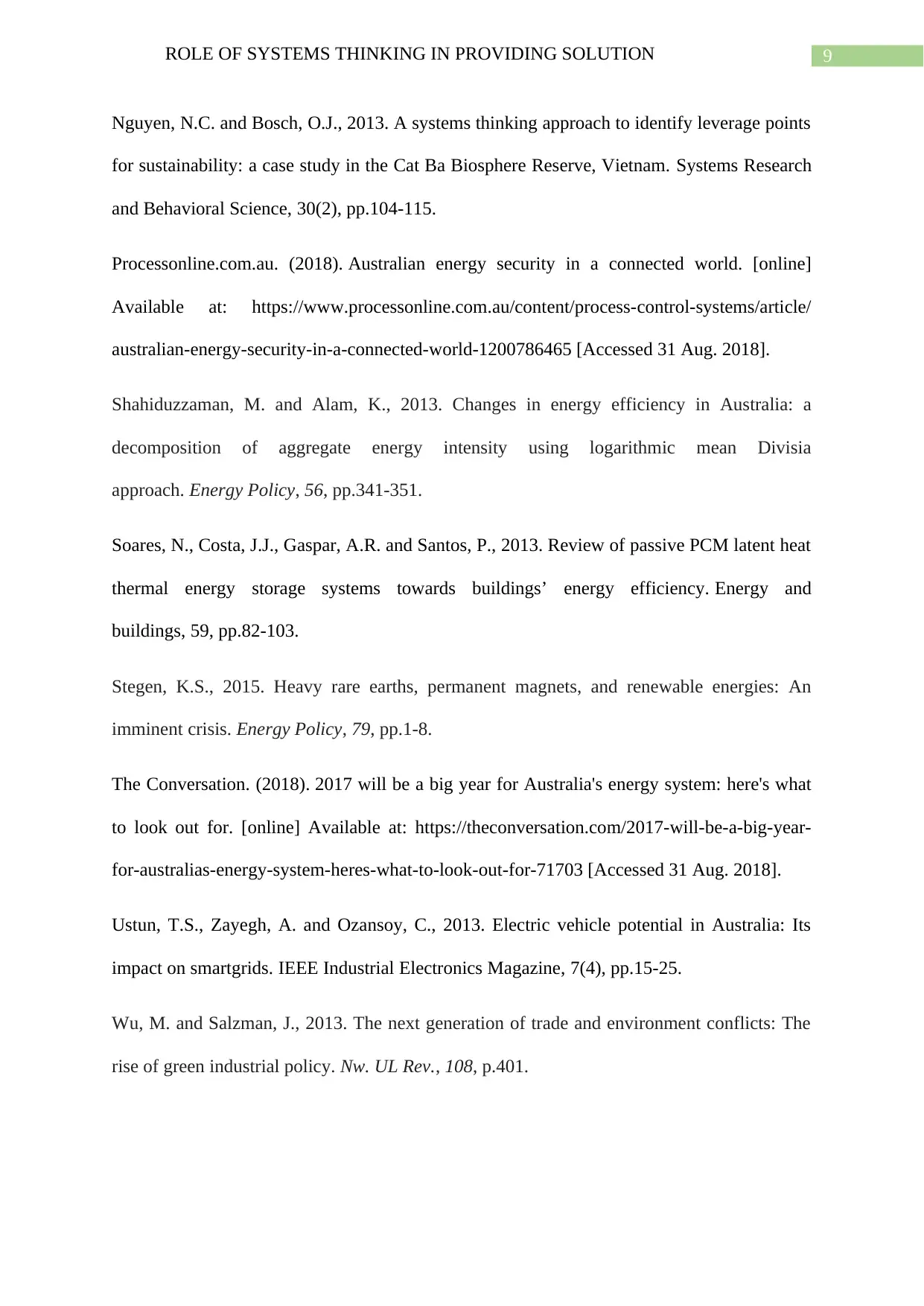
9ROLE OF SYSTEMS THINKING IN PROVIDING SOLUTION
Nguyen, N.C. and Bosch, O.J., 2013. A systems thinking approach to identify leverage points
for sustainability: a case study in the Cat Ba Biosphere Reserve, Vietnam. Systems Research
and Behavioral Science, 30(2), pp.104-115.
Processonline.com.au. (2018). Australian energy security in a connected world. [online]
Available at: https://www.processonline.com.au/content/process-control-systems/article/
australian-energy-security-in-a-connected-world-1200786465 [Accessed 31 Aug. 2018].
Shahiduzzaman, M. and Alam, K., 2013. Changes in energy efficiency in Australia: a
decomposition of aggregate energy intensity using logarithmic mean Divisia
approach. Energy Policy, 56, pp.341-351.
Soares, N., Costa, J.J., Gaspar, A.R. and Santos, P., 2013. Review of passive PCM latent heat
thermal energy storage systems towards buildings’ energy efficiency. Energy and
buildings, 59, pp.82-103.
Stegen, K.S., 2015. Heavy rare earths, permanent magnets, and renewable energies: An
imminent crisis. Energy Policy, 79, pp.1-8.
The Conversation. (2018). 2017 will be a big year for Australia's energy system: here's what
to look out for. [online] Available at: https://theconversation.com/2017-will-be-a-big-year-
for-australias-energy-system-heres-what-to-look-out-for-71703 [Accessed 31 Aug. 2018].
Ustun, T.S., Zayegh, A. and Ozansoy, C., 2013. Electric vehicle potential in Australia: Its
impact on smartgrids. IEEE Industrial Electronics Magazine, 7(4), pp.15-25.
Wu, M. and Salzman, J., 2013. The next generation of trade and environment conflicts: The
rise of green industrial policy. Nw. UL Rev., 108, p.401.
Nguyen, N.C. and Bosch, O.J., 2013. A systems thinking approach to identify leverage points
for sustainability: a case study in the Cat Ba Biosphere Reserve, Vietnam. Systems Research
and Behavioral Science, 30(2), pp.104-115.
Processonline.com.au. (2018). Australian energy security in a connected world. [online]
Available at: https://www.processonline.com.au/content/process-control-systems/article/
australian-energy-security-in-a-connected-world-1200786465 [Accessed 31 Aug. 2018].
Shahiduzzaman, M. and Alam, K., 2013. Changes in energy efficiency in Australia: a
decomposition of aggregate energy intensity using logarithmic mean Divisia
approach. Energy Policy, 56, pp.341-351.
Soares, N., Costa, J.J., Gaspar, A.R. and Santos, P., 2013. Review of passive PCM latent heat
thermal energy storage systems towards buildings’ energy efficiency. Energy and
buildings, 59, pp.82-103.
Stegen, K.S., 2015. Heavy rare earths, permanent magnets, and renewable energies: An
imminent crisis. Energy Policy, 79, pp.1-8.
The Conversation. (2018). 2017 will be a big year for Australia's energy system: here's what
to look out for. [online] Available at: https://theconversation.com/2017-will-be-a-big-year-
for-australias-energy-system-heres-what-to-look-out-for-71703 [Accessed 31 Aug. 2018].
Ustun, T.S., Zayegh, A. and Ozansoy, C., 2013. Electric vehicle potential in Australia: Its
impact on smartgrids. IEEE Industrial Electronics Magazine, 7(4), pp.15-25.
Wu, M. and Salzman, J., 2013. The next generation of trade and environment conflicts: The
rise of green industrial policy. Nw. UL Rev., 108, p.401.
1 out of 10
Related Documents
Your All-in-One AI-Powered Toolkit for Academic Success.
+13062052269
info@desklib.com
Available 24*7 on WhatsApp / Email
![[object Object]](/_next/static/media/star-bottom.7253800d.svg)
Unlock your academic potential
Copyright © 2020–2026 A2Z Services. All Rights Reserved. Developed and managed by ZUCOL.





